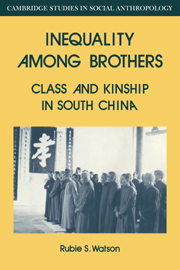Book contents
- Frontmatter
- Contents
- Preface
- Maps
- 1 Introduction
- 2 The development of the Teng lineage: Ha Tsuen's early history
- 3 Lineage organization and ideology
- 4 Economic organization: the land and the market
- 5 Local political organization
- 6 Class differences in Ha Tsuen: the social and cultural dimension
- 7 Marriage, affinity, and class
- 8 Economic and political changes: 1945–1978
- 9 Social and cultural transformations
- 10 Class and kinship
- References
- Glossary
- Index
- CAMBRIDGE STUDIES IN SOCIAL ANTHROPOLOGY
5 - Local political organization
Published online by Cambridge University Press: 30 October 2009
- Frontmatter
- Contents
- Preface
- Maps
- 1 Introduction
- 2 The development of the Teng lineage: Ha Tsuen's early history
- 3 Lineage organization and ideology
- 4 Economic organization: the land and the market
- 5 Local political organization
- 6 Class differences in Ha Tsuen: the social and cultural dimension
- 7 Marriage, affinity, and class
- 8 Economic and political changes: 1945–1978
- 9 Social and cultural transformations
- 10 Class and kinship
- References
- Glossary
- Index
- CAMBRIDGE STUDIES IN SOCIAL ANTHROPOLOGY
Summary
In the 1950s the British instituted a new system of local administration in the New Territories. Prior to that period political organization among the Ha Tsuen Teng was not highly formalized. There was no system of political offices, and the only clearly defined political institution was the village guard. Decisions were made and disputes adjudicated by informal leaders, and everyday administration was handled by religious and landholding corporations.
Prior to the 1950s, two institutions were central to local politics in Ha Tsuen. One was the community's “village guard” (hsün ting) and the other was Yu Kung T'ang. The village guard (or self-defense corps) was a policing agency and was responsible for the security of the area. The guard did more, however, than defend the local population against thieves and bandits. Ha Tsuen's village guard provided the force that backed up Teng territorial claims, especially the claims of Teng landlord-merchants.
Although Yu Kung T'ang was not an overtly political organization, it was nonetheless deeply involved in local politics. Yu Kung T'ang provided a framework for handling community and hsiang affairs, and as a consequence the manager of Yu Kung T'ang played an important leadership role. At the turn of the century, as we have seen, the manager was Teng Cheng-ming, one of Ha Tsuen's leading landowners.
At first examination, Ha Tsuen's political system appears highly egalitarian; this is in fact the way the villagers themselves often present their political arrangements.
- Type
- Chapter
- Information
- Inequality Among BrothersClass and Kinship in South China, pp. 83 - 97Publisher: Cambridge University PressPrint publication year: 1985



